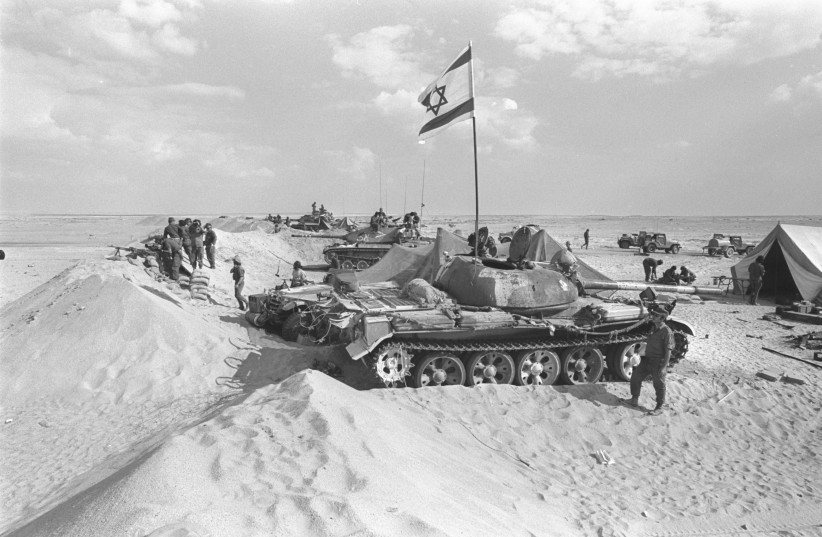At first glance, the title seems wrong and even delusional. How was the Yom Kippur War a victory? Thousands of dead, almost 10,000 wounded, and a recognized national trauma. Is it really fair to call it a victory?
The answer is yes.
Of course, I am not ignoring the many terrible losses during a difficult war that took Israel by surprise when it broke out at noon on Yom Kippur in 1973. Nonetheless, in cold military terms, when you compare the situation at the beginning of the war to the situation at the end, there is no escaping the obvious conclusion that it was a huge victory, albeit at a huge price.
The war broke out by surprise. In the south, Egyptian forces crossed the Suez Canal completely unexpectedly and set up large bridgeheads on the eastern side. In the north, Syrian commando forces raided an Israeli observation post on Mount Hermon with helicopters and armored forces that were advancing across the Golan Heights.
The Israel Air Force suffered many losses from Soviet anti-aircraft missiles. The State of Israel was struck by surprise and in the hearts of the political leadership there was a feeling that this could be the end of Jewish sovereignty in the Land of Israel.

Israel’s situation on the various fronts and its morale was very bad.
During the war, the situation was reversed
However, during the war, and thanks to the determination of soldiers and commanders, the situation was reversed. Reserves were mobilized, and properly armed units moved to the battlegrounds and fought back.
In the south, the IDF managed to stop the Egyptian advance further into the Sinai, encircled Egypt’s Third Army, and subdued it. They then deployed floating rafts to cross the Suez Canal and poured armored and infantry forces onto its west bank.
If not for the Soviet threat of using nuclear weapons, the IDF would have been able to advance quickly and without resistance reaching Cairo. The Soviet threat stopped the army 101 km. from the Egyptian capital.
On the Syrian front, the army managed to destroy and repel all the Syrian forces from the Golan, free the Hermon, and take territory not far from Damascus. The Syrian army was dealt an almost mortal blow, and if it weren’t for the Soviet threat on this front as well, the army could have reached Damascus.
The fighting was fierce and the thousands of dead and wounded in this difficult war testify to the seriousness of the challenge that the State of Israel faced. At a high cost and in great pain, Israel turned a seeming defeat during the war’s first stages into a situation where the enemy’s armies were destroyed and large amounts of its territories under Israeli control.
A greater victory that the Six Day War in 1967
From a dry military point of view, and when you compare Israel’s situation at the beginning of the war to its end: among its army, leadership, and people, there is no escaping the conclusion that it was a huge victory. It could be argued that it was greater than the victory in the Six Day War in 1967 which took only a few hours to destroy the enemies’ planes.
The air forces of Egypt, Jordan, and Syria, were vanquished leading the army’s path later in the war and allowing it to conquer Sinai, Judea, Samaria, and the Golan Heights, and all this in only six days.
The victory in the Yom Kippur War was the main factor that pushed the president of Egypt, Muhammad Anwar el-Sadat, to seek peace with Israel.
Sadat realized that despite the fact that Israel had been caught by surprise, that Egypt had managed to cross the Suez Canal on the first day, and that Israel had to face two fronts acting in coordination, it was able to inflict a strong defeat on both the Egyptians and the Syrians, removing them from the territories they occupied at the beginning of the war – and eventually conquering additional territories far beyond.
President Anwar Sadat understood that Israel was invincible and all Arab attempts to conquer and destroy it, past and future, were doomed to failure.
Based on this conclusion, two years after the war he opened a series of secret talks with Israel and these talks led to a historic peace treaty signed in 1979.
This conclusion is still valid today and should be clearly understood. Only an Israeli victory can bring peace because in the Middle East peace is only accepted by those who see their enemies as invincible.
The writer is a renowned expert on the Middle East, a lieutenant colonel (res.) in the IDF Intelligence Corps, and a member of the Israel Victory Project.
